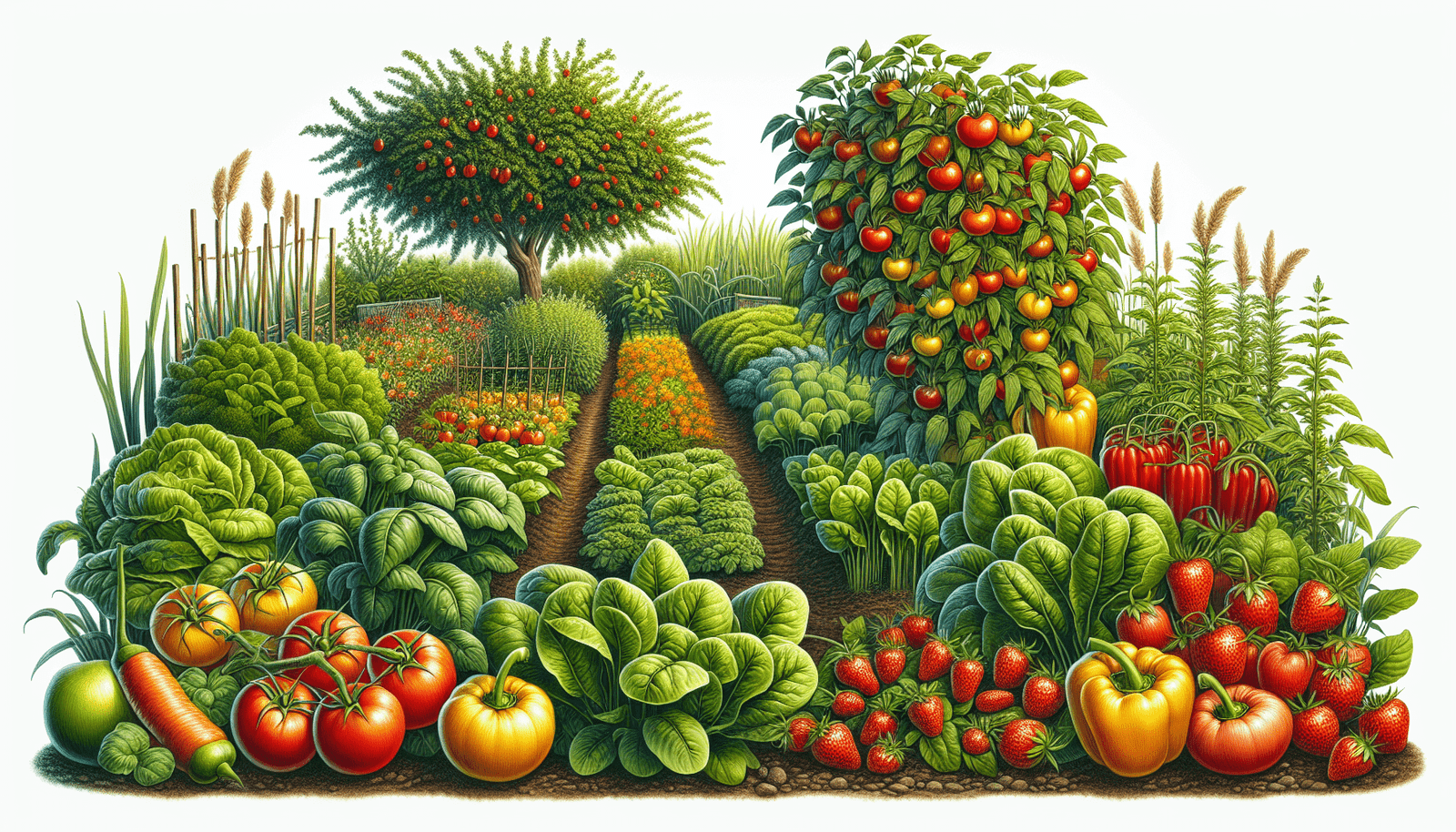Are you curious about the benefits of organic gardening? If so, you’re in the right place! We’re here to shed some light on the advantages of embracing this natural and sustainable gardening practice. From promoting biodiversity and reducing chemical exposure to producing healthier and more flavorful crops, organic gardening offers a plethora of benefits that are sure to leave you inspired to pick up your gardening tools and embark on an organic gardening journey of your own. So, let’s dive in and explore the wonderful world of organic gardening!

Health Benefits
Nutritional Value of Organic Produce
When you choose to grow your own organic produce, you are providing yourself and your family with food that is packed with essential nutrients. Organic gardening focuses on building healthy soil, which in turn leads to nutrient-rich crops. The use of natural, organic fertilizers ensures that the plants receive the necessary minerals and vitamins for optimal growth. As a result, the fruits and vegetables you harvest from your garden will be bursting with flavor and beneficial nutrients.
Reduced Exposure to Chemicals
One of the significant advantages of organic gardening is the reduced exposure to harmful chemicals. Traditional farming methods often rely on synthetic pesticides and fertilizers, which can leave behind toxic residues on the crops. By choosing organic gardening, you are eliminating the risk of ingesting these chemicals. You can have peace of mind knowing that the food you are consuming is free from harmful substances, which can have long-term effects on your health.
Environmental Benefits
Preservation of Soil Health
Organic gardening practices focus on nurturing the soil rather than depleting it. Through the use of compost and other organic matter, the soil’s structure, moisture-holding capacity, and nutrient content are improved. By maintaining soil fertility, organic gardening helps preserve the natural balance of microorganisms that play a crucial role in breaking down nutrients and making them available to plants. This sustainable approach to soil management ensures that the soil can continue to support plant growth for years to come.
Protection of Water Sources
Traditional farming methods often involve the use of synthetic fertilizers and pesticides, which can leach into the water sources and contribute to water pollution. Organic gardening, on the other hand, employs natural methods to nourish plants and control pests. By avoiding the use of harmful chemicals, organic gardeners help protect local waterways and prevent contamination of essential drinking water sources. This sustainable practice preserves the purity of our water resources and supports a healthy ecosystem.
Conservation of Biodiversity
Organic gardening plays a vital role in conserving biodiversity. By cultivating a diverse range of plants, including native species, organic gardeners create habitats for beneficial insects, birds, and other animals. These creatures play a crucial role in pollination, pest control, and maintaining a balanced ecosystem. Additionally, by preserving heirloom and traditional seed varieties, organic gardening helps protect genetic diversity in our food system. The conservation of biodiversity ensures the long-term health and resilience of our environment.
Cost Savings
Lower Expenses on Pesticides and Fertilizers
One of the economic benefits of organic gardening is the significant savings on pesticides and fertilizers. Traditional gardening often requires the frequent application of synthetic chemicals, which can be quite expensive. Organic gardening utilizes natural methods such as composting, crop rotation, and companion planting to maintain healthy plant growth and ward off pests naturally. This not only saves you money on purchasing chemicals but also reduces the amount of waste generated from their packaging.
Reduced Healthcare Costs
Eating fresh, nutrient-rich organic produce can have a positive impact on your health and well-being. By growing your own organic fruits and vegetables, you are incorporating more wholesome foods into your diet, which can help prevent various health issues. Research has shown that organic produce tends to have higher levels of antioxidants and beneficial compounds, which support a strong immune system and overall well-being. By investing in your health through organic gardening, you can potentially reduce healthcare costs associated with chronic diseases.
Taste and Quality
Enhanced Flavor
One of the undeniable delights of organic produce is its superior taste. The natural methods and sustainable practices employed in organic gardening lead to crops that are bursting with flavor. The rich, healthy soil produces fruits and vegetables that are allowed to ripen fully, resulting in a more robust and satisfying taste. The freshness and quality of homegrown organic produce are unparalleled, elevating the enjoyment of each bite and inspiring creativity in the kitchen.
Improved Texture
Organic gardening not only enhances the flavor of plants but also improves their texture. The carefully cultivated soil provides plants with the proper balance of nutrients, resulting in optimal growth and development. This translates into fruits and vegetables that possess a desirable texture, whether it be a crisp, juicy apple or a silky, tender leaf of lettuce. The attention to detail and natural approach to gardening ensure that each harvest is a delight to the senses.
Higher Nutrient Content
Organic gardening focuses on the health and vitality of the plants, which directly correlates to their nutrient content. Studies have shown that organic produce tends to have higher levels of certain vitamins, minerals, and antioxidants compared to conventionally grown counterparts. For example, organically grown spinach has been found to contain more vitamin C and iron than conventionally grown spinach. By consuming organic produce, you are nourishing your body with food that is naturally nutrient-rich, supporting your overall health and well-being.
Sustainability
Ecosystem Preservation
Organic gardening prioritizes the preservation and conservation of natural ecosystems. By avoiding the use of synthetic pesticides, herbicides, and fertilizers, organic gardeners help protect the delicate balance of the environment. Beneficial insects, birds, and other wildlife are not harmed by the chemicals used in conventional gardening. Additionally, organic gardening practices promote soil health and biodiversity, contributing to the long-term sustainability of our ecosystems.
Reduction in Carbon Footprint
Traditional farming practices often rely on fossil fuel-intensive machinery and transportation to manage large-scale operations. On the other hand, organic gardening emphasizes localized food production and minimal use of machinery. By growing your own organic food or supporting local organic farmers, you are reducing the carbon footprint associated with commercial agriculture. This contributes to the reduction of greenhouse gas emissions, helping combat climate change and create a more sustainable future.
Community Connection
Promotion of Local Economy
Organic gardening has a positive impact on the local economy by supporting local farmers and businesses. By purchasing organic produce from local farmers’ markets, you are directly contributing to the financial well-being of your community. The money circulates locally, benefiting not only farmers but also other businesses and individuals. This support strengthens the local economy, fostering a sense of community and connection among residents.
Social Interaction and Education
Engaging in organic gardening often opens doors to social interaction and education. Participating in community gardens or joining local organic gardening groups allows you to connect with like-minded individuals who share a passion for sustainable living. Sharing tips, techniques, and successes with fellow gardeners can be a enriching and educational experience. Additionally, organic gardening provides an opportunity to educate others, including children, about the importance of sustainable practices and the benefits of fresh, organic produce.
Gardening as a Hobby
Physical and Mental Health Benefits
Engaging in organic gardening offers a myriad of benefits for both physical and mental health. Spending time outdoors, tending to plants, and engaging in physical activity such as digging, weeding, and harvesting, contributes to improved physical fitness. Gardening provides an opportunity for stress reduction and relaxation, allowing you to escape the hustle and bustle of daily life. It promotes mindfulness and a sense of calmness, positively impacting mental well-being.
Creative Outlet
Organic gardening offers a creative outlet for individuals of all ages. From planning and designing your garden to selecting and arranging plants, organic gardening allows you to express your creativity. Experimenting with different plant combinations, colors, and textures can be both stimulating and fulfilling. Whether you have a small balcony garden or a spacious backyard, organic gardening provides endless opportunities for you to explore and unleash your creativity.
Safe for Children and Pets
Free from Harmful Chemical Residues
Organic gardening ensures that the food you grow is free from harmful chemical residues, making it safe for everyone, including children and pets. By avoiding the use of synthetic pesticides, you eliminate the risk of exposure to toxic substances. This is particularly important for the younger members of your family, whose developing bodies may be more susceptible to the harmful effects of chemicals. Organic gardening provides a safe and healthy environment for children and pets to explore and enjoy nature.
Food Security
Self-Sufficiency
By engaging in organic gardening, you are taking a step towards achieving food security for yourself and your family. Growing your own food provides a sense of self-sufficiency, as you no longer have to solely rely on external sources for your nutritional needs. By cultivating a diverse range of crops, you can ensure a steady supply of fresh, organic produce throughout the growing season. This empowers you to become less dependent on the uncertainties of the global food supply chain.
Food Safety
With increasing concerns about food safety and traceability, organic gardening offers a solution. By growing your own food, you have complete control over the cultivation practices and can be confident in the safety and quality of what you consume. You know exactly how your plants were grown and what inputs were used, giving you peace of mind and assurance in the food you put on your plate. This control over your food supply promotes a healthier and safer eating experience.
Preservation of Traditional Farming Practices
Protection of Indigenous Knowledge
Organic gardening serves as a means of preserving traditional farming practices and indigenous knowledge. Many traditional farming methods have been passed down through generations, embodying valuable wisdom and expertise. By engaging in organic gardening, you are honoring and perpetuating these time-honored practices, ensuring that they are not lost to modern industrial agriculture. Supporting and practicing organic gardening helps preserve the cultural heritage embedded in sustainable and holistic farming approaches.
Cultural Heritage
Traditional farming practices often hold deep cultural and historical significance. Organic gardening provides an opportunity to preserve and celebrate cultural heritage, as many indigenous communities have long embraced sustainable agricultural methods. By adopting these traditional practices, we can continue to honor and respect the wisdom and traditions of our ancestors. Organic gardening serves as a connection to our roots, fostering a sense of cultural identity and pride in our farming heritage.
Organic gardening offers a wealth of benefits that extend beyond the boundaries of our gardens. From improved health and well-being to environmental preservation and the promotion of community connections, organic gardening provides a holistic approach to sustainable living. By taking the step towards organic gardening, you are not only cultivating nutritious, flavorful produce but also making a positive impact on your own life and the world around you. So, grab your gardening tools, embrace the joy of growing your own organic food, and reap the many rewards that accompany this fulfilling and enriching endeavor.


